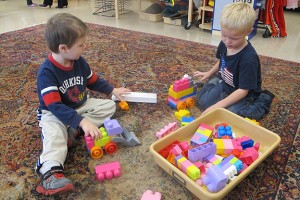What One County’s Experience Might Mean For Statewide Pre-K
It’s been more than a week since election results came in, but one of the big ballot items this cycle will have repercussions well past November 4.
Ballots in Bartholomew County tasked voters with deciding whether to voluntarily raise their property taxes to fund pre-k scholarships for low-income children. Their decision was no.
This isn’t the first time the district has asked residents to help the area’s youngest students – a similar referendum also failed in 2012.
The outcome of this vote could influence the larger discussion on how to fund pre-k programs statewide. Other communities were looking to Bartholomew County’s model to fund their own preschools, and Governor Pence and his advisers plan to use a similar public-private partnership model as they kick off the state’s first pre-k pilot program.
Back To The Drawing Board
As we’ve reported, the referendum could have provided up to $12.6 million dollars over seven years – enough funding to send 450 low-income students to Busy Bees Academy, a preschool program funded by private donations.
Bartholomew Consolidated School Corporation pre-k director Cathne Holliday says the program has been working.
“We see growth daily, we see children have their ‘aha’ moments on a daily basis,” Holliday says. “It just makes you feel great. You realize that what we are doing is having a positive impact on kids.”
On election night, it was clear the stakes were high. After a few hours of hitting ‘refresh’ on election results, BCSC Superintendent John Quick thanked supporters for all their hard work – and reminded them he wouldn’t give up.
“Our goal was to go from good to great, and it didn’t work out this time but we’ll have to just go back to the drawing board,” Quick said.
Taxes & Timing
Fifty-four percent of voters said no to the referendum that could have raised up to $12.6 million dollars over seven years. That margin was almost exactly the same as when the same measure failed when it appeared on the ballot 2012.

Rachel Morello / StateImpact Indiana
The BCSC referendum could have raised up to $12.6 million dollars over seven years for Busy Bees scholarships.
Back then, the measure lacked specific language and local advocacy groups like Pre-K 4 All had not campaigned as heavily as they did this year. But even with those changes, referendum supporters says they aren’t sure where the group went wrong this time around.
“I’m convinced that the populace was much more educated this time about what this was,” says Jeff Caldwell, BCSC Board of Trustees president. “I think maybe its’ different financing, and that’s kind of a state-level challenge, because there’s not much available to us other than property taxes.”
State lawmakers implemented property tax caps in 2008. Because schools get a lot of their money from property taxes, they are increasingly turning to voter-approved tax levies to make up for shortfalls in district revenues.
In the last six election cycles, Indiana has seen 104 school-related referenda placed on the ballot, and about half have passed.
Larry DeBoer, an economics professor at Purdue University, has a theory about why Bartholomew County’s initiative has not been successful: he says it could be an issue of timing.
“In May, you attract the people who are really interested in the referenda question, and that includes the parents whose children directly benefit from whatever the referendum is proposing,” DeBoer explains. “In November, you attract people who are interested in statewide and national elections who may not even know that there is a referenda on the ballot, and when they get into the voting booth, they see it will raise their taxes. If they aren’t parents, maybe they vote no, or they’re more likely to vote no.”
And DeBoer says it because of this, it might be to Bartholomew County’s benefit to try again. They may not have any other choice. Since the tax reforms took hold, almost all of a school district’s funding comes from either the state’s aid formula or property taxes.
“There’s a sliver [of money] from the federal government, and of course there are small grants that a school corporation gets,” DeBoer says. “But if you’re talking about a big program that’s going to need money for operating costs and teacher salaries year after year after year, you’ve got to go either with the state aid or property taxes. It would be hard to see how you could sustain something that big.”
What Does This Mean For The Rest Of Indiana?
Bartholomew County leaders say they are confident they’ll find other revenue for Busy Bees Academy. What they’re more concerned about is what their community’s decision could mean for the future of early education statewide.
Earlier this year, Governor Mike Pence signed legislation approving a small-scale pre-k pilot program for low-income four-year-olds that will start in January. The program relies on existing money from the state’s Family and Social Services Administration, as well as matching funds from groups within the five chosen communities.

Rachel Morello / StateImpact Indiana
Students at Busy Bees Academy in Columbus use clay during free time.
Pence has said he favors a local, organic approach rather than a top-down mandate to enhance early childhood education in the state — which is why some pre-k supporters question why the governor didn’t make a stronger push for the BCSC measure to pass.
“Governor Pence made a point of saying we don’t want federal dollars because we typically don’t like the down the road hooks that come with it, and I get that,” Jeff Caldwell says. “But he also at the same time said as a state we’re going to spend $10 million of our dollars to run these five pilots this next year. And here you’ve got a county populace that was saying we’d like to step up and try this ourselves. I thought it was a good opportunity for Governor Pence to say yeah, that’s the way to do it.”
The governor’s office did not return calls for comment on this referendum.
In some other parts of the state, Indiana communities are finding financial support for their own programs. Just last week, Indianapolis Mayor Greg Ballard reached an agreement with his City-County Council to free up $20 million in city funds for his proposed pre-k initiative.
Columbus pre-k supporter Kathy Oren, executive director with the Community Education Coalition, says those successes should give other neighborhoods hope.
“Every community is different. Every community needs to look at what their challenge is,” Oren says. “I would say we hope that every community will try and do whatever they can to make sure all their children are being served.”
[pullquote] We are here for these kids, whether it was a yes vote or a no vote. – Cathne Holliday, BCSC Pre-K Director[/pullquote]
Larry DeBoer says he’s sure other counties will examine Bartholomew County’s referendum history when considering trying their own.
“There’s no doubt the superintendents talk to each other and the school boards talk to each other, and one of the things that gets talked about at practically every meeting is, ‘what’s going on with the referenda? How did you get your referenda passed?'” DeBoer explains. “No doubt that the Bartholomew County experience will be talked over. Whether that will scare people off, I don’t know.”
No matter where funds come from, or how long it takes to find them, Cathne Holliday says parents and all other community adults should keep in mind what – and who – they’ll be working for.
“We are here for these kids, whether it was a yes vote or a no vote, they are what mattered the most,” Holliday says. “We do owe these kids the opportunity for a safe, quality early childhood education.”
For now, BCSC will likely divert some Title I money being used in the area’s other public pre-k programs toward Busy Bees. Superintendent Quick says he also plans to talk to existing private community partners to discuss possible next steps. District officials could also wait and hope the state’s pre-k pilot is successful, so lawmakers expand the program and provide more state funding.

